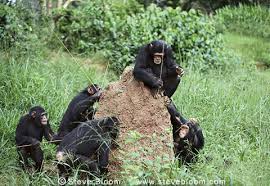I've been meaning to write about Jane Goodall for a while, and Brenda Rothman's post on bias in autism research inspired me to finally do so.
When I was a child, my intellectual hero was Jane Goodall. I wanted to be her when I grew up.
I didn't realize at the time that Jane Goodall's story is about the biases that prevent scientists from seeing what's in front of them. Through keen observation, stubbornness, and a supportive mentor, Jane discovered evidence that eventually disproved the scientific community's assumptions about her subjects and overcame their biases.
When Jane started her fieldwork observing wild chimpanzees in the 1960's, she experienced culture shock. She didn't know she wasn't supposed to give the chimps names rather than numbers, ascribe different personalities to different individuals, or describe them as experiencing emotions like grief or jealousy--until she tried to present her work to other academics.
Academics believed that it was unscientific to "anthropomorphize" animals. To them, "anthropomorphizing" meant interpreting animals' behavior using any mental concepts at all--thoughts, emotions, and personality were all off limits. They assumed that if scientists saw evidence of a mental life in animals' behavior, they must be projecting what they knew about humans onto the animals. This approach could prevent people from ascribing thoughts and feelings to animals that weren't there. However, they failed to realize that it could also blind them from seeing ones that were. Ironically, their ideas about what it meant to be objective prevented them from achieving the accurate picture of reality they sought.
But Jane Goodall knew chimpanzees had personalities as she saw, for example, aggressive and shy ones every day. She knew they experienced grief because she saw a young chimp able to feed itself die after its mother died.
Her mentor, Louis Leakey, prevented a furious Jane from fighting a losing battle with the scientific establishment. He suggested diplomacy in her writing, saying things like "as if Fifi were jealous" rather than "Fifi was jealous." He also advised her to ignore the critics for the time being and focus on building up data.
Pretty soon, she was observing all sorts of behavior then believed to be unique to humans. She saw one group "making war" against another, attacking (mostly male) members of the other group one member at a time and then leaving them to die of their wounds. She saw female chimps attacking new mothers and taking their babies, and sometimes eating them. She also saw two young orphan chimps adopted by totally unrelated males who had also lost their mothers--a level of altruism only humans were believed to possess.
The ace in the hole, though, was when she observed two chimps making tools. David and Goliath stripped leaves off of stems to make long, thin sticks for scooping termites out of their mounds. They weren't just finding tools in their environment--they were making and using them. Jane later noticed that chimpanzees taught younger members of the group how to make tools and predicted that there would be cultural differences in the way far-flung groups of chimpanzees made tools--a prediction which turned out to be correct, and which I read about in the newspaper when I was a child.

Above: Chimpanzees using sticks to get termites out of their mound.
Above: Chimpanzees using sticks to get termites out of their mound.
Now that most educated people accept that chimpanzees and several other species use tools, it's hard to explain how revolutionary the finding seemed at the time. Jane Goodall's mentor, Louis Leakey, wrote as soon as he heard, "Now we must redefine 'tool,' redefine 'man,' or accept chimpanzees as humans."
Today, Jane Goodall's discoveries don't seem like as big a deal, because she won. After much debate, scientists accepted that chimpanzees make tools and have at least "basic" emotions (i.e., happiness, fear, anger, sadness, disgust, surprise). Most educated people now accept these facts, too. As a result, scientists are no longer so blinded by their ideas of how to be objective that they can't see the evidence in front of them--at least, not when it comes to animal intelligence*.
When it comes to humans, though--especially autistic humans--we still have a long way to go. We still see what we expect to see.
Some researchers design studies with the pre-existing expectation that autistic people lack a "social brain"--the ability to understand their own minds and feelings or those of others'. Of course, if you assume something isn't there, you won't find it--but that doesn't mean it isn't there. Those scientists who are already questioning the "social module" theory are facing stiff opposition, just as Jane Goodall did. But I expect that one of them will, like Jane Goodall, find a piece of evidence that's a smoking gun. Eventually, the predominant scientific view of autism and DSM definition for it will seem as backward as when homosexuality was classified as a mental illness.
There's one more important similarity. Scientists never questioned their assumptions that animals lacked a mental life because they never had enough exposure to animals outside of an artificial setting to see what they were really like. If other researchers had actually gone out into the wild and observed chimpanzees 24 hours a day, 7 days a week, they could have observed the same things Jane Goodall did. Similarly, those researchers without an autistic family member only see autistic people for brief periods of time in highly artificial settings--and remember, most researchers don't actually run their own studies, so they may never see autistic people at all. Unlike with chimps, they can't follow a few autistic people day in and day out writing down everything they say and do, as this would be unethical. But they can start doing studies in schools and workplaces. And even more importantly, they can listen.
*And she's still making the world better by working to save chimpanzees and their habitat.
No comments:
Post a Comment